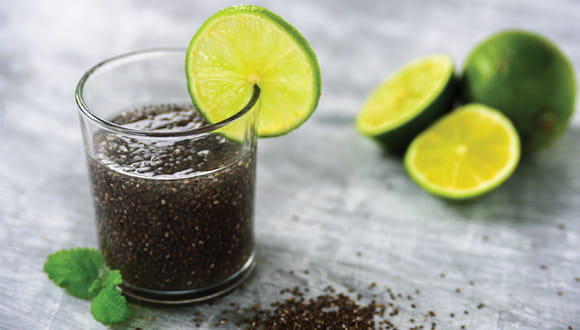By now, you've likely heard of chia seed water, a popular wellness trend.
The claimed benefits of this drink include satiety — these seeds are packed with fiber, after all — and even weight loss. More recently, it's been popularized as an "internal shower," a way to clear out your gut and get things moving.
"Chia seeds are really good for us, so there's some truth to how chia seed water can benefit you," says Amanda Beaver, a wellness dietitian at Houston Methodist. "There's no real downside to drinking it, but there are a few things I recommend keeping in mind."
Beaver adds that reaping chia seeds' benefits doesn't have to mean drinking a gelatinous — let's face it, off-putting — beverage.
What are chia seeds good for?
"Chia seeds are good for us because they have so many different beneficial nutrients," says Beaver. "They also contain important vitamins and minerals, including calcium, magnesium, iron and B vitamins."
Nutrients responsible for the benefits of chia seeds include:
- Viscous fiber – a type of fiber especially good for heart health
- Omega-3 fats – a type of healthy fat most Americans don't get enough of
- Antioxidants – a cornerstone of an anti-inflammatory diet
"At about five grams per tablespoon, chia seeds are an excellent source of fiber, which is important since fiber has so many health benefits," says Beaver.
Fiber can help you feel fuller for longer, which is why chia seed water can help stave off hunger. Whether this leads to actual weight loss, though ... that's less clear.
Since they contain a lot of insoluble fiber — the kind that helps bulk up your stool while still keeping it soft — chia seeds can help get things moving in your gut. Hence, the current trend of drinking chia seed water to help promote a bowel movement.
"Chia seeds also contain viscous fiber, which has a binding quality to it," explains Beaver. "This type of fiber can trap excess bile and cholesterol in our GI tract, which our body then eliminates when we go to bathroom."
This unique property of chia seeds is that they help balance cholesterol levels, a benefit to heart health.
3 things to know before drinking chia seed water
Because of its health benefits, Beaver is absolutely a proponent of adding chia seeds to your diet.
But if you're doing so by drinking chia seed water, she has a few tips.
1. Start with just 1 Tbsp of chia seeds
While some chia seed water recipes call for two (or more) tablespoons of these seeds, Beaver recommends starting out with just one.
"Chia seeds are very fibrous, and it's best to increase your fiber intake gradually," says Beaver. "If you add too much into your diet too fast, it can cause gastrointestinal issues such as bloating, gas and constipation."
Plus, a single tablespoon contains five grams of fiber, more than enough to get started if your goal is to add more fiber into each meal.
2. Drink it with a meal to unlock its full potential
Chia seeds are packed with nutrition, but Beaver still recommends drinking chia seed water along with a meal.
"Viscous fibers provide the most benefit when we consumed with food," Beaver explains. "The trapping action of these fibers is most efficient when we eat them as part of a larger meal."
3. Don't let chia seed water sit out
The only thing Beaver truly worries about with chia seed water is that the seeds can sprout if left in water for too long, a food-safety risk.
"Chia seed recipes call for some soaking time, but it's important to drink the mixture soon after — within two hours — or refrigerate it," recommends Beaver.
Is there an advantage to putting chia seeds in water, specifically?
Given the popularity of chia seed water, specifically, you might wonder if it's the best way to consume these seeds.
"You don't need to suspend chia seeds in water to reap their benefits," says Beaver.
That being said, Beaver points out that adding such a high fiber food into your diet does mean you will need to increase your water intake.
"Fiber tends to pull water into our GI tract," explains Beaver. "If you increase your fiber intake but not your water intake, it can lead to dehydration and an increased chance of constipation."
That's one major appeal of chia seed water: it adds water and fiber at the same time, simplifying things.
But Beaver offers some alternative options for people looking to add chia seeds into their diet without having to drink this clumpy, gelatinous beverage.
"There are plenty of ways to work chia seeds into your meals — as a topping or while baking, for instance," Beaver adds. "Another popular option is chia seed pudding, where you mix chia seeds with some type of milk and fruit and then refrigerate overnight."
Other ways to add chia seeds into your diet include:
- Blending them into a smoothie
- Adding them to oatmeal
- Sprinkling them on top of yogurt
- Mixing them into homemade granola
- Adding them into baked goods, like energy bites or breakfast cookies
"Just be sure you're adding a little more water into your diet, too," adds Beaver.








